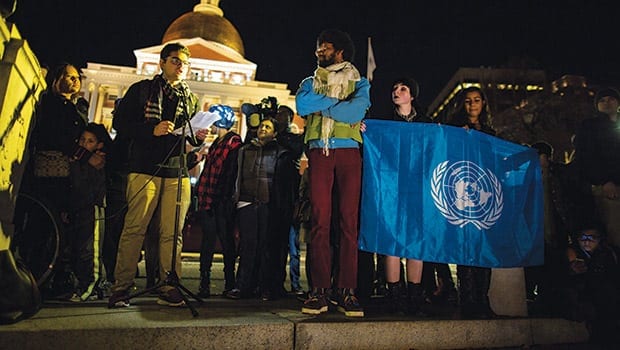
Leaving a country torn apart by warring factions and bombed by U.S., Russian and European forces as well as their own government, more than four million Syrians are seeking resettlement in what has become the largest refugee crisis since World War II.
While European and Middle Eastern countries are struggling to accommodate the millions of Syrians, the United States has taken in just 2,174 since 2012. But despite this relatively scant number of refugees in the U.S., their presence, along with news of the recent ISIS-backed bombing in Paris, has sparked a surge in anti-Muslim rhetoric in the U.S. that many find worrisome.
In the Boston area, the flare-up of anti-Muslim and anti-refugee sentiment has prompted action from local human rights activists. On Friday, hundreds rallied outside the Massachusetts State House, protesting Governor Charlie Baker’s statement that Massachusetts would not accept Syrian refugees.
“We’re really concerned that the calls for restricting refugee flows are feeding bigotry against Muslims,” said Shannon Erwin, Executive Director of the Muslim Justice League, one of the conveners of Friday’s rally. “When policy makers use events to put people in fear of Muslims, that gives a false credibility to people’s prejudices and fears. That’s what we’re seeing with Syrian refugees.”
Erwin said many Muslims in Massachusetts are reporting incidents of hate speech and harassment.
State Rep. Byron Rushing said Baker may be the first Massachusetts elected official in recent history to refuse refugees, although he noted Baker does not have the authority to block the federal government.
“He can’t stop the federal government from resettling refugees here,” he said.
Perhaps most prominent among the critics of refugees at the national level is presidential candidate Donald Trump, who called for extensive surveillance of Muslims in the United States and went so far as to support the idea that Muslims should be required to carry special identification cards.
The backlash against Syrian refugees, and Muslims more broadly, has become even more public and political as 31 governors, all but one of them Republican, have said they will not accept Syrian refugees. Also last week, the U.S. House passed a Republican-backed bill that would suspend the Obama administration’s plans to admit 10,000 Syrian refugees next year.
The growing wave of anti-Muslim rhetoric obscures the fact that none who participated in the Paris bombing was Syrian. The violent ISIS movement that planned the attack is one of several entities terrorizing the civilian population in Syria and prompting the massive exodus of refugees. The backlash against the trickle of Syrian refugees being admitted to the U.S. has raised concerns that the country is heading down a dangerous path.
“Treating Trump as a joke gives his noxious ideology room to grow,” writes M. Dove Kent, executive director of the New York-based Jews for Racial Justice in a piece that ran in the British newspaper The Guardian. “The climate he is creating has very real implications for the safety and lives of people of color, Muslims and immigrants.”
Kent’s group and other Jewish organizations including the United States Holocaust Museum say the nativist reaction to Syrian refugees has chilling parallels to the World War II era, when the United States turned their backs on Jews fleeing persecution and extermination in Nazi concentration camps.
Rushing called the anti-refugee stance of the GOP members of Congress posturing.
“It’s part of the Republican move to the right,” he said. “Someone has to stand up and fan the flames. That’s what the Republicans in Congress are doing.”


![Banner [Virtual] Art Gallery](https://baystatebanner.com/wp-content/uploads/2024/04/Cagen-Luse_Men-at-store-e1713991226112-150x150.jpg)



